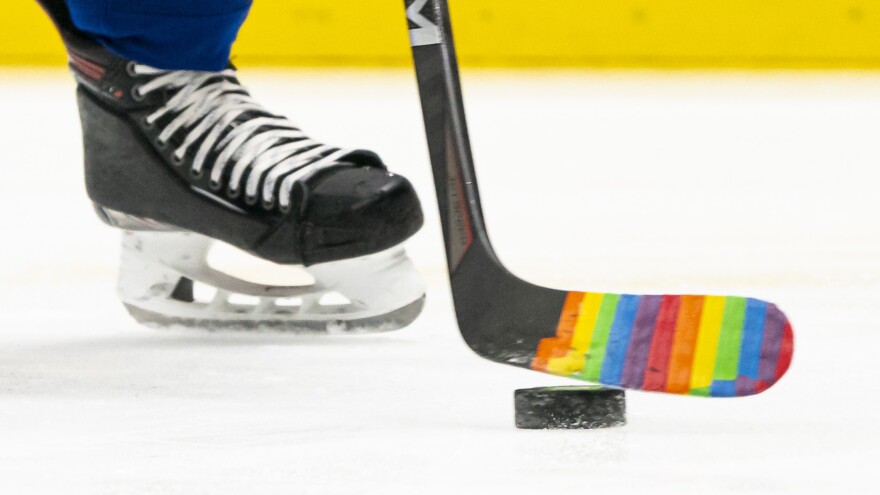Rainbow-colored Pride Tape has been part of pro ice hockey for seven years, symbolizing the sport's pledge to be welcoming and inclusive. But the NHL has banned the athletic tape, quickly sparking a backlash.
Critics say the league's decision is a step backward. High-profile players say they're disappointed. At least one player said he'll likely use the colorful tape anyway.
"I'll use the tape — if I have to buy it myself, I will," Philadelphia Flyers forward Scott Laughton said on Wednesday, discussing how he would mark his team's Pride Night.
"We will send Scott and his teammates all the free Pride Tape they want," Kristopher Wells, a co-founder of Pride Tape, said in response.
Other NHL players said that while they disagree with the ban, they will respect the league's rules. Neither the NHL nor the NHL Players' Association responded to NPR's requests for comment on the ban.
What's the context of the tape controversy?
The NHL announced over the summer that its players will no longer wear special jerseys during warmups to mark "theme nights," when teams show support for a variety of groups, from the LGBTQ+ community to Indigenous groups, the military, and people fighting cancer.
But as the NHL prepared to start a new season, it sent a memo announcing the ban also applies to Pride Tape, saying players aren't allowed to use it at any time.
The abrupt shift came after several NHL players made headlines last season for refusing to wear Pride Night themed jerseys, citing religious or other reasons.
"What happened last year was that the issue of who wanted to wear a particular uniform on a particular night overshadowed everything that our clubs were doing," NHL Commissioner Gary Bettman said this week. By taking themed jerseys out of the equation, he said, the league is trying to eliminate a distraction.
But the ban itself has taken up attention on its own. News of the policy was first reported by outlets including Outsports and ESPN.
Is Pride Tape a new thing?

The multicolored Pride Tape quickly became an "ingrained part of hockey culture" — and that quote comes from the NHL's own website, in a story from 2021.
The tape got a big boost in early 2016, when the Edmonton Oilers used it as a way to support young LGBTQ+ athletes who might otherwise quit playing ice hockey in the face of homophobia and discrimination.
The NHL made Pride Tape an integral part of its teams' Pride Night celebrations, even selling the tape in its official league shop. The tape was part of outreach efforts such as Hockey Is For Everyone — a slogan that is now being questioned by critics of the NHL's new policy.
"If Hockey is for Everyone, this is not the way forward," the You Can Play project said in response to the ban. The group has been a partner of the NHL since at least 2013, working to strengthen a sense of belonging for LGBTQ+ athletes, coaches and fans.
But, it says, "It is now clear that the NHL is stepping back from its longstanding commitment to inclusion, and continuing to unravel all of its one-time industry-leading work on 2SLGBTQ+ belonging."
What exactly is Pride Tape?
Pride Tape was backed by a Kickstarter campaign in 2015, as a simple way to encourage LGBTQ+ youth to get involved in team sports.
"These kids don't have many professionals to look up to — and for young hockey players, there are no 'out' role models at all," its founders said. "So how can the hockey world show their support with pride? With a simple roll of tape."
The tape has bright blocks of color, to replace the standard white or black tape hockey players normally use on their sticks. The company says it's made from "a cotton blend high performance cloth using a special dye" that is meant to stand up to repeated use in hockey and other sports.
The company says it can be used on everything from hockey sticks to "shafts, bats, rackets, handle bars, etc." in other sports.
Within months of production starting, Pride Tape was on NHL players' sticks. It also made it to peewee hockey leagues, where the kids on one team reportedly used the tape to show support for their coach.
What's the reaction within pro hockey?
"It sucks," Calgary Flames defenseman Rasmus Andersson said repeatedly when asked about the new prohibition.
"It's something that's close to my heart and something I would love to support. But it is what it is, and we've got to find other ways to support it," Andersson said. Of the drama that arose around rainbow-colored tape and jerseys, he added, "It's a sensitive subject for some people, I don't understand why, but it is."
"It's unfortunate," Toronto Maple Leafs defenseman Morgan Rielly said. He later added, "Whatever statement was made is fine, but as players, we're gonna continue to offer support and be allies. We want to be a part of this community."
Brian Burke, a former NHL and team executive who has advocated for hockey's inclusion of the LGBTQ+ community, called the new policy "a surprising and serious setback."
Luke Prokop, an openly gay hockey player who is a prospect in the Nashville Predators organization, said this summer that he was disappointed to see some teams cancel pride nights after players refused to participate.
"Pride nights are an essential step towards fostering greater acceptance and understanding in hockey," Prokop said. He later added, "As someone who aspires to play on an NHL team one day, I would want to enter the locker room knowing I can share all parts of my identity with my teammates."
Copyright 2023 NPR. To see more, visit https://www.npr.org.



